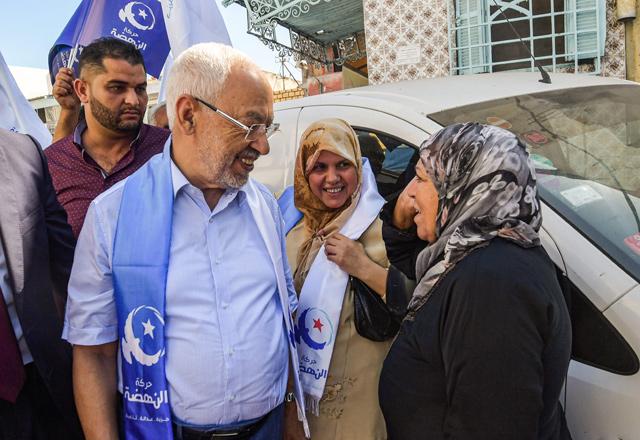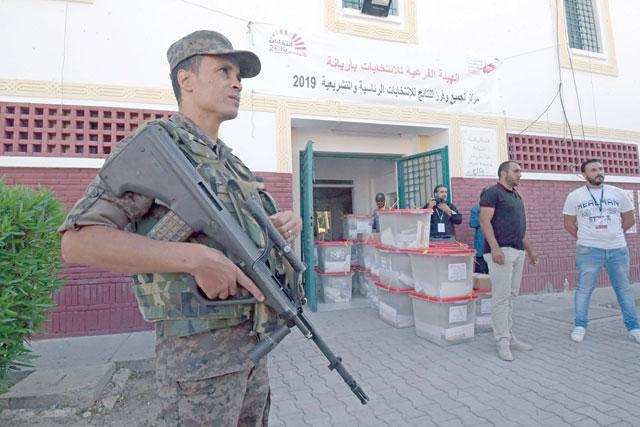You are here
Five things to know about Tunisia’s parliamentary election
By AFP - Oct 02,2019 - Last updated at Oct 02,2019

Ennahdha Party leader Rached Ghannouchi (centre) meets with people while campaigning for his party ahead of the legislative elections in the capital Tunis, on Tuesday (AFP photo)
TUNIS — Millions of Tunisians will head to the ballot box on October 6 to elect their parliamentary representatives in a key vote overshadowed by presidential polls.
Here are five things to know about the parliamentary vote.
When?
Voting will take place in a single round on Sunday October 6.
The parliamentary election will be the second since the adoption of a new constitution in 2014, and the third since the 2011 uprising that toppled long-time dictator Zine Al Abidine Ben Ali.
Preliminary results are expected on October 9
Who is running?
More than 15,000 candidates, running on more than 1,500 lists, are competing for 217 seats.
At least a third of the lists are independent, adding to the challenge of understanding a political landscape already fractured into a multitude of parties with few substantive differences.
The fortunes of the main party in parliament, the Islamist-inspired Ennahdha, have flagged of late.
Its leader Rached Ghannouchi is thought to want to lead the assembly.
The Nidaa Tounes Party won big in 2014 but is unlikely to repeat the performance. A big tent party founded on an anti-Islamist platform, Nidaa Tounes later allied with Ennahdha but has since splintered.
Ex-Nidaa Tounes members have formed several new parties in recent months.
Tahya Tounes was launched by Prime Minister Youssef Chahed, who was knocked out of the first round of the presidential election, while Qalb Tounes was created by jailed media magnate Nabil Karoui.
Other parties are presenting fresh faces. The Aich Tounsi movement is financed by entrepreneur Olfa Terras, who is running for Bizerte in the north.
What about the presidential vote?
Presidential elections scheduled for November were moved forward after the death of President Beji Caid Essebsi in July. This places the parliamentary election between the the first and second round of the presidentials.
Campaigning for the parliamentary polls has been overshadowed by the presidential race in which mogul Karoui advanced to the second round, despite being detained in a money-laundering probe.
He will face Kais Saied, a fiercely independent and socially conservative academic.
A strong performance by Qalb Tounes in the parliamentary election could boost Karoui’s chances in the presidential run-off.
For his part, Saied said he is opposed to the party system and offered no endorsements for the parliamentary election.
“There is no clear polarisation, which is accentuating the lack of enthusiasm,” said Michael Ayari, Tunisia analyst with the International Crisis Group.
Across the country, large numbers of billboards made available to candidates have remained blank.
Who will the winners be?
Compared to 2014, when Ennahdha and Nidaa Tounes shared power, the outcome of these elections is unpredictable, especially after the upset in the first round of the presidential poll.
None of the candidates who have been at the forefront of the political scene in recent years advanced past the first round of that vote.
The publication of opinion polls is prohibited but according to informal surveys, independent lists could lead the parliamentary poll, ahead of Karoui’s Qalb Tounes and Ennahda.
Movements like Aich Tounsi and Karama, led by the populist Islamist lawyer Seifeddine Makhlouf, could follow.
The Free Destourian Party, led by the anti-Islamist lawyer Abir Moussi, will hope to improve on the 4 per cent she won in the first round of the presidential vote
What will it change?
The assembly will be charged with forming a new government, which needs a majority of 109 votes.
According to Ayari, given the political fragmentation “it is possible that no majority will emerge” within the timeframe provided by the constitution.
The party with the most seats has two months to form a government. Otherwise the president can nominate a prime minister, who will in turn have two months.
To obtain a majority, the leading list will likely need to assemble four or five blocs. But this may prove challenging as “some of these have campaigned against each other”, said Lamine Benghazi from the political observatory Al Bawsala.
Too much political uncertainty would be detrimental to the revival of the economy — a promise made by candidates across the political spectrum as Tunisians struggle with rising prices, declining public services and unemployment of more than 15 per cent.
Related Articles
TUNIS (AFP) — Just weeks after Tunisians rejected ruling political parties in the first round of presidential polls, voters are set to retur
TUNIS — Exit polls showed an established Islamist-inspired party leading that of a jailed business tycoon in Tunisia's legislative polls on
TUNIS — The leader of Tunisia's Islamist-inspired Ennahdha party, Rached Ghannouchi, was elected parliament speaker on Wednesday, a mon


















